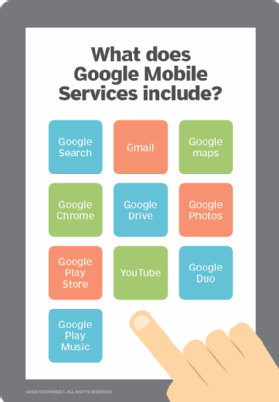Android Open Source Project (AOSP)
What is the Android Open Source Project (AOSP)?
The Android Open Source Project (AOSP) is the repository of source code and the foundation which maintains it that is responsible for the core of the Android operating system. Using code from AOSP, anyone can download and create their own operating system based on Android. Some examples of AOSP derived projects are Amazon Fire OS and LineageOS.
The AOSP is overseen by the Open Handset Alliance (OHA), a Google-led coalition of over 80 companies, consisting of wireless carriers, semiconductor companies, handset manufacturers and software companies. The purpose of the OHA is to further the development of Open Source standards for mobile devices. The OHA and AOSP were founded in November 2007. The AOSP code is released under the Apache 2.0 license.
What is the relationship between AOSP, Android phones and Google?
Android Inc., was founded in 2003 with the goal of producing a Linux-based operating system (OS) for mobile phones. Google purchased Android in 2005 from its original founders. Google wanted Android to be an open ecosystem, so it released the source code to the OS and core components through the AOSP.
The AOSP code contains the things needed to make a basic OS and some core apps. It includes the kernel, the hardware abstraction layer, the Android runtime and some core apps. It does not include all the pieces needed to make a functioning smartphone though. A device manufacturer will need to add other portions that are not open source, such as device drivers and Google apps.
To help illustrate the AOSP, it is like the plans to make a car engine and its controls. The manufacturer will need to add the wheels, body, interior and styling.

Google maintains control of the core design and future plans of the Android OS. When developing new versions, Google does not release the source code until after a stable build is released. So, while AOSP is open source in that anyone can copy and reuse the code, it does not readily accept edits by people outside the project to be merged into production builds and has strict contributing guidelines.
Android: A Google trademark
The Android name is trademarked and owned by Google. For a device to be deemed Android compatible it must be able to run Android apps (APK file) and meet the standards set out in the Android Compatibility Definition Document. Devices that are Android compatible can also license Google Mobile Services and Google apps to allow the device to come with preinstalled software such as Chrome, Google Play Store, Google maps and YouTube.
The majority of Android-based smartphones distributed in most countries meet these requirements and have licensed Google apps. This is why smartphones from Samsung and Sony have Google services preinstalled.

Some device manufacturers only use the open source components of AOSP and not the Google proprietary portions. For example, Amazon Fire OS is AOSP based but does not include Google services, so device owners must use the Amazon app store.
Due to sanctions on technological exports, Chinese device manufacturers cannot use Google services but may use AOSP code. For example, Huawei HarmonyOS is thought to be a fork of AOSP. Third-party ROM makers can freely produce and distribute replacement operating systems based on AOSP for old devices but cannot include Google services in the code.
Since AOSP doesn't provide everything needed to compile a complete OS, it isn't stock or plain Android. Google would also say that the non-open source Google apps are needed to complete the Android experience. Android-based systems that stick close to AOSP without making many changes or replacing the launcher are often easier to run and more consistent though.
Fuchsia is a new operating system under development by Google. Fuchsia is still in early development and there are no public plans to replace Android at this time.
See how to create a work profile on Android devices and how to delete or disable or restore an Android work profile. Compare iPhone vs. Android privacy for employee devices.







